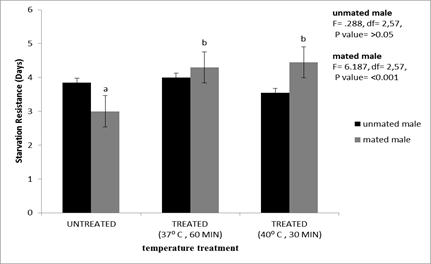Journal of Entomology and Zoology Studies
Volume 2, Issue 2
Short term sub lethal temperature treatment increases starvation resistance in D.melanogaster
Author(s): Koushik Ponnanna CR and Krishna MS
Abstract: Today’s changing environment imposes challenge to the regular homeostasis of organisms, which forces them to face periods of stressful conditions. The changing environmental conditions can evoke a genetic response in organisms which is of a major interest of study in population biology. Influence of short term sub lethal temperature exposure on starvation resistance has been studied in out bred population of Drosophila melanogaster. It was noticed that short term sub lethal temperature treated flies significantly mated faster, copulated longer, transferred greater quantity of Accessory proteins to mated females and these females had greater resistance to starvation than untreated flies suggesting that during extreme thermal conditions and food deprivation, mating is highly beneficial for females as it confers resistance towards starvation. This study rules out the idea that mating may impair female fitness as proposed earlier.

Fig: Starvation resistance of mated and unmated males of D. melanogaster for both untreated and treated groups. Different letters in the bar graph indicate significance at p<0 by Tukey’s post hoc test
Download Full Article : Click Here
Advertisement:


